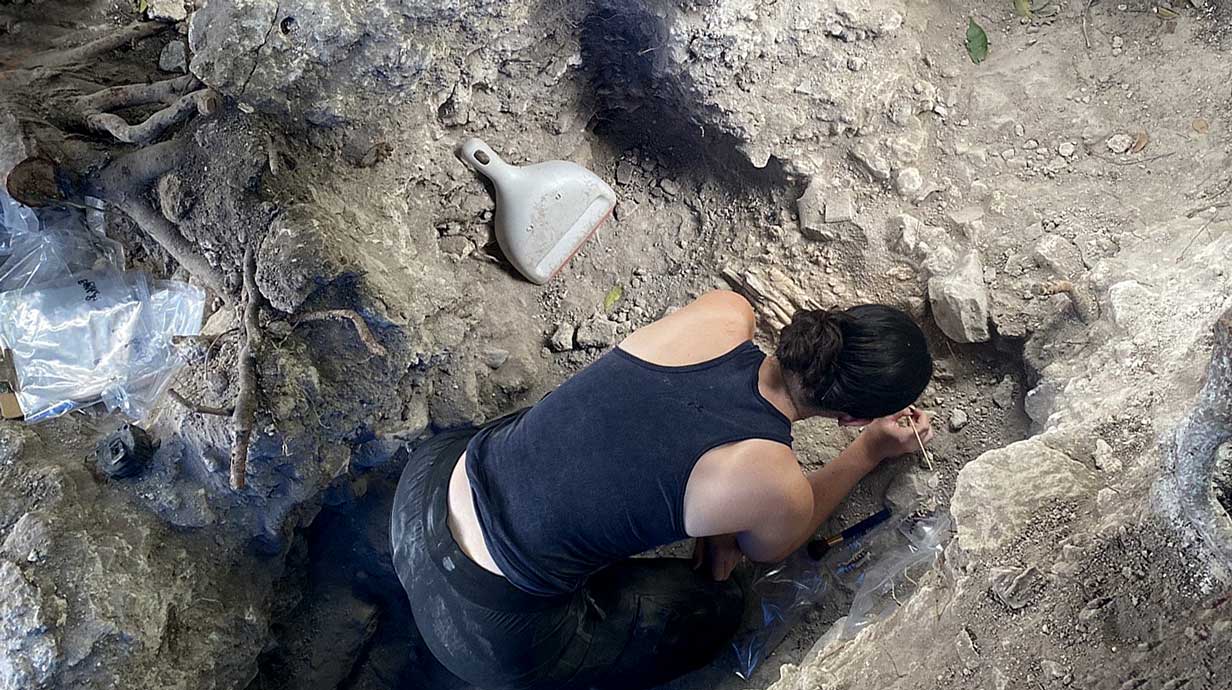Anthropology, M.A.
Explore the complexity of human societies and cultures, past and present.

About the Master of Arts in Anthropology
The Department of Sociology and Anthropology in the College of Liberal Arts offers a M.A. in Anthropology degree. Our four-field anthropology program offers courses in cultural, biological, and linguistic anthropology, and in archaeology that together provide a solid foundation for careers in anthropology and beyond. It is designed to prepare students to pursue a Ph.D. in a subfield of their choosing or to begin professional careers as applied/practicing anthropologists and archeologists.
The small class sizes and hands-on work with faculty provide a dynamic, supportive environment. Our curriculum and employment opportunities also emphasize the methods anthropologists need for successful careers with quantitative anthropology, research design & methodology, and two seminars that cover topics from CVs and job search panels to navigating ethics and thesis writing. Optional courses are available in digital anthropology, ethnographic methods, human osteology, forensics, and zooarcheology, as well as courses elsewhere on campus in GIS and forensic chemistry.
Alumni of the Master of Arts in Anthropology pursue careers in:
- Non-governmental and governmental organizations
- Archaeology conservation organizations
- Cultural resource management
On this Page…
Program Information
Degree
Required Credit Hours
30
Program Type
Master's Program
Program Location
School
Duration
2 years
Welcome from the Graduate Program Coordinator
Our Master's program in anthropology offers four-field training in cultural anthropology, biological anthropology, linguistic anthropology, and archaeology. Through a combination of coursework and hands-on research experience, we provide our students with a solid foundation for careers in anthropology and beyond. The relatively small size of our program means that faculty can work closely with graduate students and provide them with robust mentorship over two years. Many of our graduates have found jobs at cultural resource management (CRM) firms, while others have gone on to fully funded Ph.D.s at top universities. Please reach out to us if you are interested in joining our program!
Carolyn Freiwald
Professor of Anthropology
M.A. in Anthropology Program Details
Learn about the application process, academic requirements, and the financial support available to you.
APPLICATION DEADLINE: February 15
The Department of Sociology and Anthropology welcomes student applications.
- Complete the Graduate School’s Online Application.
- Upload Supplemental Application materials for the Department of Sociology and Anthropology to the link provided by the online application.
Students in the M.A. in Anthropology program complete 30 credit hours, including
- Anth 572: Quantitative Methods in Anthropology
- Anth 601: Anthropological Theory and Methods
- Anth 606: Seminar in Cultural Anthropology
- Anth 607: Seminar in Biocultural Anthropology
- Anth 608: Seminar in Archaeology
- Anth 609: Seminar in Research Design & Methodology
- Anth 604, 605: Professional Development Seminars I, II
- 6 credit hours of thesis credit
Students must attain a B- or better in Anth 572, 601, 606, 607, 608, and 609.
To complete the degree, students pass a comprehensive exam, pass a written and oral defense of a research proposal, and write and defend a thesis.
Most students accepted into the program receive funding in the form of teaching and research assistantships. Students with a graduate assistantship funded in the Department of Sociology and Anthropology receive a
- scholarship that covers some or all of the tuition and non-residency fee, if applicable, for regular semesters and
- subsidized health insurance.
For more information, visit Graduate Programs in the Department of Sociology and Anthropology.
The Graduate School's financial aid webpage lists a variety of funding possibilities.
The Department of Sociology and Anthropology is located in Lamar Hall, which has teaching, computer, and ethnography labs that provide spaces for anthropology students to gain hands-on training in a variety of topical methods courses, such as bioarchaeology, zooarchaeology, ceramics, and lithics. Shared offices and workspaces for graduate research are also available, including an isotope preparation area.
- Students work in our Ethnographic Laboratory, which is equipped with NVivo software and statistical programs used in data analysis.
- Fieldwork experience is facilitated by grants from the university and via mentorship and internships with faculty. Students have completed fieldwork in Mississippi and other Southeastern US sites as well as in Latin America.
- The Center for Archaeological Research has a 2,800 square-foot multipurpose research lab and manages the archaeological and ethnographic collections curated by the department.
Department of Sociology and Anthropology
Department Video
Next Steps
Explore Affordability
We have a variety of scholarships and financial aid options to help make college more affordable for you and your family.
Apply to the University of Mississippi
Are you ready to take the next step toward building your legacy?
